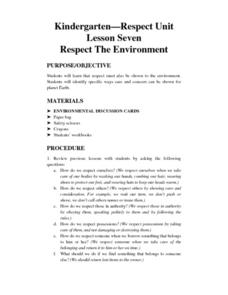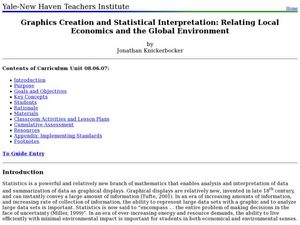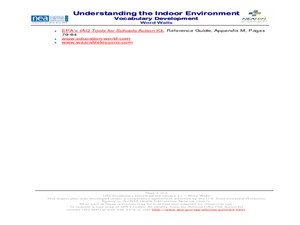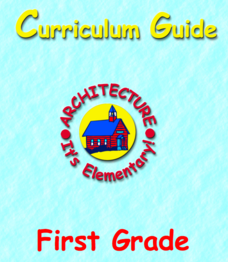CK-12 Foundation
CK-12 Earth Science Concepts for Middle School
Explore a variety of science concepts in an interactive textbook created for middle school scholars. A lengthy table of contents takes readers to pages comprised of a subject overview, outline, and summary. Follow links further to find...
SF Environment
Sort and Color!
Sorting is a very important skill that can be used in math and even science. Learners get familiar with some environmentally friendly vocabulary terms as they practice separating objects that can be recycled from those that can't. They...
Curated OER
Kindergarten-Respect Unit (Lesson Seven) Respect The Environment
Students review the concept of respect and that they should respect, not only themselves, but those around them. They comment on some example pictures in which the environment is NOT being respected and decide what should have been done...
Curated OER
Science and the Envrionment
Students utilize a digital camera to record interesting objects in their environment. In this ecology lesson, students participate in a mini-field trip around their campus as they take 2-3 pictures of the school environment. Students...
Baylor College
Resources and the Environment: The Math Link
Take advantage of this interdisciplinary resource and bring together topics in science, language arts, and math. Use characters and events from the story Tillena Lou's Big Adventure as a context for practicing addition and subtraction,...
Practical Action
Climate Change - Who's In Control?
How can both individuals and governments respond to climate change and take responsibility to reduce its effects on our environment? Here you will find three lessons filled with discussion, debate, and role-playing...
Curated OER
Graphics Creation and Statistical Interpretation: Relating Local Economics and the Global Environment
Students apply statistics, and graphical interpretation to economics, the environment and populations. In this statistical lesson students construct graphical displays and classify data.
Curated OER
What is a Living Thing, and How Does a Living Thing Respond to Its Environment?
Students investigate how living things interact with their environment. In this living things lesson, students complete lessons for science investigations on what living things have in common. Students study cells, complete...
Curated OER
Understanding the Indoor Environment: Word Walls
Students study vocabulary words about indoor air quality. In this indoor environment lesson, students create a word wall with vocabulary words about indoor air quality and pollutants.
National Library of Medicine
Your Environment, Your Health: The Great Debate—Bottled Water vs. Tap Water in Our School
Should bottled water be sold in schools, or should they only provide tap water? The summative unit in the six-part series encourages scholars debating this topic. The lessons teach how to build an argument, how to gain background...
National Museum of the American Indian
The A:Shiwi (Zuni) People: A Study in Environment, Adaptation, and Agricultural Practices
Discover the connection of native peoples to their natural world, including cultural and agricultural practices, by studying the Zuni people of the American Southwest. This lesson includes examining a poster's photographs, reading...
Curated OER
Science Questions
Explore the concept of generating questions. Your curious learners choose a scientific question from a bowl and, as they listen to an article being read, they use that question starter to come up with their own questions. Then, they have...
Howard Hughes Medical Institute
Natural Selection and Evolution of Rock Pocket Mouse Populations
Can evolution repeat itself? Scholars analyze amino acid data in two separate populations of mice. They learn that evolution repeats itself, but natural selection prefers some mutations over others in different environments. Analysis...
Curated OER
Fossil Fuels (Part I), The Geology of Oil
Junior geologists work through three mini-lessons that familiarize them with the formation and location of fossil fuels. Part one involves reading about petroleum and where it comes from via a thorough set of handouts. A lab activity...
Desert Discoveries
The Sonoran Desert
Elementary schoolers study the geographic location of the Sonoran Desert. They pay close attention to the characteristics of the plants and animals found in this desert environment. The student handouts embedded in this plan are...
Curated OER
Environmental Benefits of Recycling
Fourth graders understand the benefits of recycling. In this recycling literacy instructional activity, 4th graders read an article and identify the main idea. Students understand the process of transfer to the landfill and discuss how...
Arbor Day Foundation
Trees are Terrific...Inside and Out!
Trees are the star of a three-step unit celebrating Arbor Day. Step one takes an in-depth look into the structure of a tree, the process of photosynthesis, and the benefits of the leafy giants. Step two challenges scholars to create a...
Curated OER
School Forest
Sixth graders explore the concept of biodiversity. In this biodiversity lesson, 6th graders discover a variety of planets and animals that live in forests, and how a rotting log benefits that environment. Students also locate seven...
Centers for Disease Control and Prevention
Understanding the Epidemiologic Triangle through Infectious Disease
Introduce infectious diseases and the epidemiologic triangle. A helpful resource describes the agent, host, and environment from the three vertices as well as the time factor, which is in the middle. Scholars complete a simple...
American Institute of Architects
Architecture: It's Elementary!—First Grade
Build an interest and appreciation for architecture in your young learners with this fun 10-lesson art unit. Engaging children in using their five senses, the class first observes the environment around them, paying special attention to...
Chicago Botanic Garden
Unit 3 Pre-Test, Grades 7–9
Earth's systems respond to changes in environments in all types of ways including migration, extinction, adaptation, immigration, and emigration to name a few. Part one in a series of seven is a pre-test consisting of 14 questions. Some...
Curated OER
Words In the News Big Rise in CO2
Middle schoolers complete vocabulary and word work activities including an online quiz. They read an online article while focusing on answering specific information questions. They discuss ways to improve the environment and present them...
Curated OER
Where Is Away?
Students explore garbage. In this landfill lesson, students investigate how much garbage is collected in landfills on average each day. Students discover hazardous materials that are disposed of improperly and the effects of these...
Curated OER
Food Chain
Fourth graders explore the concept of food chains. In this food chain lesson, 4th graders discuss what different animals eat and how they are all connected. Students explore a garden and the environment around them to find examples of a...
Other popular searches
- Living Environment Science
- Environment Science Labs
- Land Use Environment Science
- Environment Science Dilemma
- Environment Science Graphing
- Environment Science Air
- Environment Science Mcuk
- Environment Science Muck
- Environment Science Vocab
- Science Environment
- Environment Science Hands On
- Science and the Environment

























